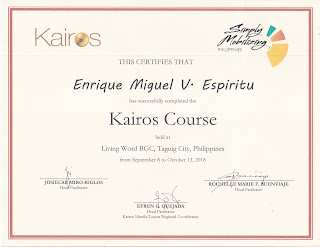MSPG 2 - God's Redemptive Plan in the Old and New Testaments
I don't pretend to be a missions expert, but the church has to start somewhere. The Lord has been teaching me more and more about missions since 2015, and I've spent a lot of time in the last two years exploring this important aspect of the church's life.
Since Elynne and I are planning to migrate soon to study at TMS, I don't have much time to share what I've been learning with others. So in the next five months, January to May, I'm holding a weekly "Missions Study & Prayer Group" (MSPG) to equip them to help in the church's developing missions program.
For overviews and links to all the lessons in this ongoing series, click here.
The story of redemption is primarily about God, but it’s also about His people. This story is the foundation of missions. Because of this, missions makes sense. Without it, missions is just another pearl on the necklace.
We don’t have time to study these texts, but my goal is to give you a theological framework to help you study these verses for yourself.
The creation event also tells us about the fundamental nature of human beings. We are God’s creatures. We are not gods. We are not meant to be gods. But at the same time, we are not like every other creature in the universe because we are made in God’s image. That means we are God’s governors of the earth. We represent God’s lordship over creation.
We see in the Fall an inversion of God’s plan.
Everything since is in this fallen condition.
The themes we see here – God’s rule, God’s presence with man, sin, and redemption are central to Christianity, and to prove it, let’s jump to the book of Revelation.
The saints (a.k.a., all saved people from the OT and NT) comprise a new humanity that serves God as vice-regents over creation (21:7; 22:5).
(Note: This is not a remodeling of the present world, but a recreation of the world. Other elements in these chapters that aren’t found in Genesis 1-3 reflect further developments in the biblical story.)
What It Means
All this means that the Bible, Christianity, and missions is all part of God’s big plan to make the world the way He originally designed it to be. Missions is not the goal, it is a means – a very important means – to make humanity and the world right again.
Notice how Noah is like a new Adam living in a new creation. And therefore the Noahic Covenant is full of hope. God reaffirms man’s creation mandate (9:1-7). He mitigates the effects of the curse (8:21). And God creates the rainbow as a guarantee that mankind will be preserved until redemption is accomplished.
But notice that the covenant doesn’t solve man’s problem of sin. Noah gets drunk. His son, Ham, dishonors him and is cursed (9:20-25). Noah’s descendants continue to reject God and to seek their own glory (“name”), as reflected in the incident at Babel (11:1-9). It’s clear that something more is needed for God’s promise in Genesis 3:15 to happen.
The need for this becomes obvious as time passes. The kingdom divided into two separate states. The Davidic line turns progressively away from the Lord. The northern kingdom falls to the Assyrians, and later even Judah falls to Babylon.
All this shows that it’s not enough to have the Law. People are too sinful to obey God. A further covenant is needed to replace the Mosaic Covenant and to complete the Abrahamic and Davidic Covenants.
Therefore God, through the prophets, promises restoration. The nations will be witness (v. 10). God’s people will repent (v. 18-19). A new covenant is promised, wherein “I will put My law within them and on their heart I will write it” (vv. 31, 33).
Note the importance of the verb “proclaiming” (κηρύσσω), and that repentance of sins, ie, obedience, is necessary (3:2, 8; 4:17), as well as faith.
How can one benefit from the New Covenant inaugurated by Christ? He must repent of his sins, believe the gospel, receive baptism, and be discipled in the church.
God’s new covenant people (the church) is to preach this good news and make disciples of all nations, as modeled for us in the book of Acts and the rest of the New Testament.
Much more could be said about what the New Testament teaches us about missions, and we will look into this in future sessions.
Since Elynne and I are planning to migrate soon to study at TMS, I don't have much time to share what I've been learning with others. So in the next five months, January to May, I'm holding a weekly "Missions Study & Prayer Group" (MSPG) to equip them to help in the church's developing missions program.
For overviews and links to all the lessons in this ongoing series, click here.
INTRODUCTION
The Story of Redemption
It’s possible to think of the Bible like a pearl necklace – just a bunch of pearls strung together. There’s teaching about this and that doctrine, but they aren’t related. But reading through the Bible, you see that there’s one story that connects the whole Bible. It is the story of redemption.The story of redemption is primarily about God, but it’s also about His people. This story is the foundation of missions. Because of this, missions makes sense. Without it, missions is just another pearl on the necklace.
God's Redemptive Plan
Now, if you want to know what a story is about, just read the first and last chapters. Everything in between just reinforces that. And the same is true for the Bible. So today, we’re going to start by looking at the first and last chapters of the Bible. Then we’ll look at key texts in between. We will see that redemption didn’t just happen, but it was all part of God’s plan from the very start. He decided why, whom, how, and when He would save. Redemption would serve a greater purpose, and it’s that purpose that makes missions so important for the church.We don’t have time to study these texts, but my goal is to give you a theological framework to help you study these verses for yourself.
THE BEGINNING AND THE END
CREATION & FALL
Genesis 1 & 2 – Creation
God’s creation of the universe shows His sovereignty and lordship: the Creator of all is also the Lord of all. He has no rivals. It also shows that God is personal, wise, and good.The creation event also tells us about the fundamental nature of human beings. We are God’s creatures. We are not gods. We are not meant to be gods. But at the same time, we are not like every other creature in the universe because we are made in God’s image. That means we are God’s governors of the earth. We represent God’s lordship over creation.
Genesis 3 – The Fall
If Adam and Eve had followed God’s plan, then we wouldn’t need redemption. But they rebelled by eating the forbidden fruit. The fruit is only important because of what it represented: a choice to worship God or reject Him. Mankind chose the latter.We see in the Fall an inversion of God’s plan.
Original Order =
God (near) > Man (leader) & Woman (supporter) > Creation (cooperative)
The Fall =
Creation (the serpent) > Man (supporter) & Woman (leader) > God
The Fallen Condition (Cursed but with Hope) =
God (distant) > Man & Woman (roles twisted by sin) > Creation (resistant)
+ Enmity between the seed of the woman and the seed of the serpent
Everything since is in this fallen condition.
The themes we see here – God’s rule, God’s presence with man, sin, and redemption are central to Christianity, and to prove it, let’s jump to the book of Revelation.
THE NEW CREATION
Revelation is the last book of the Bible. That’s not a coincidence. It’s last because it concludes the entire biblical story. It concludes God’s redemptive plan. It also resolves the problems that came from the Fall.Revelation 21-22
Revelation chapters 21 and 22 show a new creation, a restoration of God’s created order. God’s authority is universally recognized. God dwells with man again (21:3). The curse is rescinded (21:3). The wicked are excluded and punished (21:8; 22:27) and that includes the serpent (cf. 20:11-15).The saints (a.k.a., all saved people from the OT and NT) comprise a new humanity that serves God as vice-regents over creation (21:7; 22:5).
(Note: This is not a remodeling of the present world, but a recreation of the world. Other elements in these chapters that aren’t found in Genesis 1-3 reflect further developments in the biblical story.)
What It Means
All this means that the Bible, Christianity, and missions is all part of God’s big plan to make the world the way He originally designed it to be. Missions is not the goal, it is a means – a very important means – to make humanity and the world right again.
THE OLD TESTAMENT
We see God’s plan unfolding through key events in the Old Testament. Particularly important are the different covenants he establishes at different times.THE NOAHIC COVENANT
Genesis 8:20-9:17
Unlike later covenants, this one is made with all people, represented by Noah and his family.Notice how Noah is like a new Adam living in a new creation. And therefore the Noahic Covenant is full of hope. God reaffirms man’s creation mandate (9:1-7). He mitigates the effects of the curse (8:21). And God creates the rainbow as a guarantee that mankind will be preserved until redemption is accomplished.
But notice that the covenant doesn’t solve man’s problem of sin. Noah gets drunk. His son, Ham, dishonors him and is cursed (9:20-25). Noah’s descendants continue to reject God and to seek their own glory (“name”), as reflected in the incident at Babel (11:1-9). It’s clear that something more is needed for God’s promise in Genesis 3:15 to happen.
THE ABRAHAMIC COVENANT
Genesis 12 – God’s Promise to Abraham
God’s redemptive plan hasn’t changed. This plan will not be revealed to humanity in general but to a chosen people, ie, Abraham and his offspring.Genesis 15 – The Covenant Solemnized
God makes a covenant with Abraham. Redemption will be through faith (v. 6). The covenant is ensured, not by human obedience but by divine grace (vv.8-21).Genesis 17 – The Sign of Circumcision
God reaffirms the covenant as “everlasting” (v. 7) Redemption has a universal scope, but will be mediated by a chosen people (v. 6) Circumcision = obedience. Conditional for inclusion, not for fulfillment… Emphasis still on grace.Genesis 22 – Confirmation of the Covenant
The covenant already established but obedience still necessary (v. 16). The unseen hand of grace enabling sinners to obey. Abraham’s “seed” will “possess the gates of his enemies” (vv. 17-18).MOSAIC COVENANT
Exodus 191:9
Israel established as God’s special possession (v. 5). They will be a kingdom of priests, ie, mediators and a holy nation, ie, new humanity (v. 6). Note that his is not about “incarnating God’s presence,” or being a “missionary nation”. Israel wasn't called to "go" but to "show". They were to have an attractional witness: “come and join us”.BALAAM'S ORACLE
Numbers 24
Confirms the Abrahamic Covenant upon the people of Israel. What was hinted at in Genesis 22 about Abraham’s “seed” becomes more explicit, that he will be a king, and a kingdom is anticipated (v. 7).DAVIDIC COVENANT
2 Samuel 7:8-29; Psalm 89:25
The Abrahamic Covenant will be carried on through David (at least in a particular kind of way, 2 Sa 7:9, “I will make you a great name”). Israel from now on to be ruled by a king (in contrast to the purely theocratic system from the time of Moses to the Judges). David’s “seed” (singular) will receive an everlasting kingdom.- Human aspect: Solomon and future descendants. This continues the pattern of Abrahamic Covenant, wherein grace ensures but obedience is necessary (vv. 14-15).
- Divine aspect: Not seen in the text itself, but it is made clear in later developments
Psalm 45
Predicts a divine king who will rule righteously and forever with the anointing of God (v. 6).The need for this becomes obvious as time passes. The kingdom divided into two separate states. The Davidic line turns progressively away from the Lord. The northern kingdom falls to the Assyrians, and later even Judah falls to Babylon.
Psalm 110
David calls one of his descendants “my Lord,” anticipating one who would fulfill the ideals of Davidic kingship. This Lord would be “a priest forever according to the order of Melchizedek” (v.4) This means he would be a priest-king. His priesthood would also surpass that of Levi because his priesthood would not be by descent, but by divine appointment. He would be greater even than Abraham, because the latter offered tithes to Melchizedek and was blessed by him. The result is a priest-king greater than Abraham, Moses, and David! (cf. Heb. 5:6, 10; 6:20; 7:17, 21)THE NEW COVENANT PROMISED
Jeremiah 31
Jeremiah lives to see the failure of the Davidic kings. Josiah’s reforms have only a superficial and short-term effect on the people. Josiah’s successors are increasingly ungodly. This leads to the collapse of the Davidic kingdom in 586 BC. Jeremiah himself is taken from Canaan to Egypt in a kind of reverse Exodus.All this shows that it’s not enough to have the Law. People are too sinful to obey God. A further covenant is needed to replace the Mosaic Covenant and to complete the Abrahamic and Davidic Covenants.
Therefore God, through the prophets, promises restoration. The nations will be witness (v. 10). God’s people will repent (v. 18-19). A new covenant is promised, wherein “I will put My law within them and on their heart I will write it” (vv. 31, 33).
THE NATIONS INCLUDED
Though Israel becomes the focus of much of the Old Testament, it doesn’t start that way (Gen 1-11). Throughout the Old Testament, the nations are included in God’s redemptive plan (Ex 9:13-16; 1 Ki 8:41-43, 60; 10:1, 24; Psa 67; Isa 56:7; Ez 36:22-23; Hab 2:14). The OT closes with Malachi, who reiterates the new covenant (4:5-6) and declares that God’s name will be “great among the nations” (1:11; cf. 11:14; 3:12).SUMMARY
Understanding the Old Testament is key first of all to understanding biblical theology, but secondly, to understanding missions. We need to know that missions isn’t just a task that was arbitrarily given to us. It is rooted in God’s redemptive plan that can be traced to the very beginning of the Bible.THE NEW TESTAMENT
THE GOSPEL
Matthew 4:23
This is the first use of the term “gospel” (euanggel, good news), in the phrase, “gospel of the kingdom”. This emphasizes that Jesus is the long-awaited Davidic king.Note the importance of the verb “proclaiming” (κηρύσσω), and that repentance of sins, ie, obedience, is necessary (3:2, 8; 4:17), as well as faith.
Matthew 17:22
Christ will fulfill the prophecies regarding a Messiah who redeems Israel and the nations by His suffering and yet will emerge victorious (Isa. 52:13-53) This will be accomplished by His crucifixion (cf. Gal 3:13).THE MINISTRY OF THE WORD
Matthew 24:14
The gospel must be preached to all nations. There are different interpretations to this passage, and I'm still figuring out my own interpretation. Nonetheless, note the emphasis on preaching.Matthew 28:18-20
The Great Commission shows that missions is Christ’s claim of authority over all the nations. The obedience He requires is not formal worship, but discipleship (μαθητεύω), identification with Christ (baptism), and living according to His teaching (διδάσκω).THE CHURCH
Book of Acts
This records the fulfillment of Christ’s commission to preach the gospel to Jerusalem, to Judea and Samaria, and to the end of the earth (Ac 1:8). Commentators disagree as to whether this refers to a partial or complete fulfillment. Regardless, we see that the church is God’s chosen vehicle for the gospel. “Ordinary” disciples pray evangelistically and share the gospel. There are also men who are especially called to “prayer and to the ministry of the word” (6:4). There are also dedicated missionaries (Paul and his team).SUMMARY
In the verses we’ve looked at so far show that Jesus Christ is the long-awaited Davidic King, the seed of Abraham who would “possess the gates of his enemies”. But before His victory, He must first suffer and die to redeem people from their sins.How can one benefit from the New Covenant inaugurated by Christ? He must repent of his sins, believe the gospel, receive baptism, and be discipled in the church.
God’s new covenant people (the church) is to preach this good news and make disciples of all nations, as modeled for us in the book of Acts and the rest of the New Testament.
Much more could be said about what the New Testament teaches us about missions, and we will look into this in future sessions.
PRAYER ITEMS
- MSPG & Missions Program
- Pakistan (Ptr. Morris Bashir) - Ministry continued to Baluchistan and Tharparker Desert
- The Expositor's Academy - Possible partnership in short-term mission to Cambodia
- BARMM - Bangsamoro Autonomous Region in Muslim Mindanao



